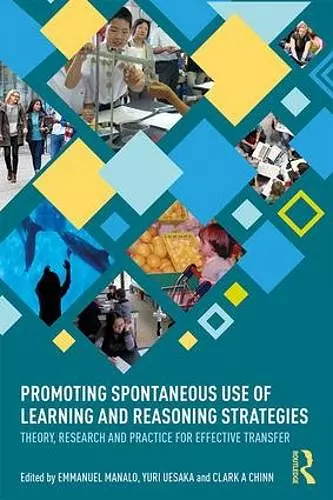Promoting Spontaneous Use of Learning and Reasoning Strategies
Theory, Research, and Practice for Effective Transfer
Yuri Uesaka editor Clark A Chinn editor Emmanuel Manalo editor
Format:Paperback
Publisher:Taylor & Francis Ltd
Published:2nd Oct '17
Currently unavailable, and unfortunately no date known when it will be back
This paperback is available in another edition too:
- Hardback£145.00was £145.00(9781138680630)

In this book, scholars from around the world develop viable answers to the question of how it may be possible to promote students’ spontaneity in the use of learning and reasoning strategies. They combine their expertise to put forward new theories and models for understanding the underlying mechanisms; provide details of new research to address pertinent questions and problems; and describe classroom practices that have proven successful in promoting spontaneous strategy use. This book is a must for educators and researchers who truly care that schooling should cultivate learning and reasoning strategies in students that would prepare and serve them for life.
A seminal resource, this book will address the basic problem that many educators are well acquainted with: that students can learn how to effectively use learning and reasoning strategies but not use them of their own volition or in settings other than the one in which they learned the strategies.
'This book addresses the critical issue of how to promote students’ use of effective learning strategies. The chapters provide strong theoretical and empirical support for applications drawn from international settings. Researchers and practitioners alike will benefit from the comprehensive coverage of this topic.' - Dale H. Schunk, The University of North Carolina, USA
'“… the search for information is a complex task that places high demand on content-related prior knowledge, self-regulatory skills, working memory capacity, and basal reading skills.” (Stadler et. al., P.48)
As illustrated in this one sentence, chapter after chapter of this important book gives the lie to populist strategy of posing a binary opposition between content knowledge and “21st century” skills or capabilities. The strong and necessary role of knowledge in capability development is clearly exemplified and theorised. The book is an invaluable source for teacher educators and teachers who want their students’ new knowledge and skills to endure—and be used—well beyond the next test or exam.' - Rosemary Hipkins, Chief researcher, New Zealand Council for Educational Research
"This book is particularly aimed at teachers and researchers who truly care that schooling should cultivate learning and reasoning strategies in students that would be helpful to them not only in school but for the rest of their lives." - UESAKA Yuri, UTokyo Biblio Plaza
'This book addresses the critical issue of how to promote students’ use of effective learning strategies. The chapters provide strong theoretical and empirical support for applications drawn from international settings. Researchers and practitioners alike will benefit from the comprehensive coverage of this topic.' - Dale H. Schunk, The University of North Carolina, USA
'“… the search for information is a complex task that places high demand on content-related prior knowledge, self-regulatory skills, working memory capacity, and basal reading skills.” (Stadler et. al., P.48)
As illustrated in this one sentence, chapter after chapter of this important book gives the lie to populist strategy of posing a binary opposition between content knowledge and “21st century” skills or capabilities. The strong and necessary role of knowledge in capability development is clearly exemplified and theorised. The book is an invaluable source for teacher educators and teachers who want their students’ new knowledge and skills to endure—and be used—well beyond the next test or exam.' - Rosemary Hipkins, Chief researcher, New Zealand Council for Educational Research
ISBN: 9781138680647
Dimensions: unknown
Weight: 680g
342 pages